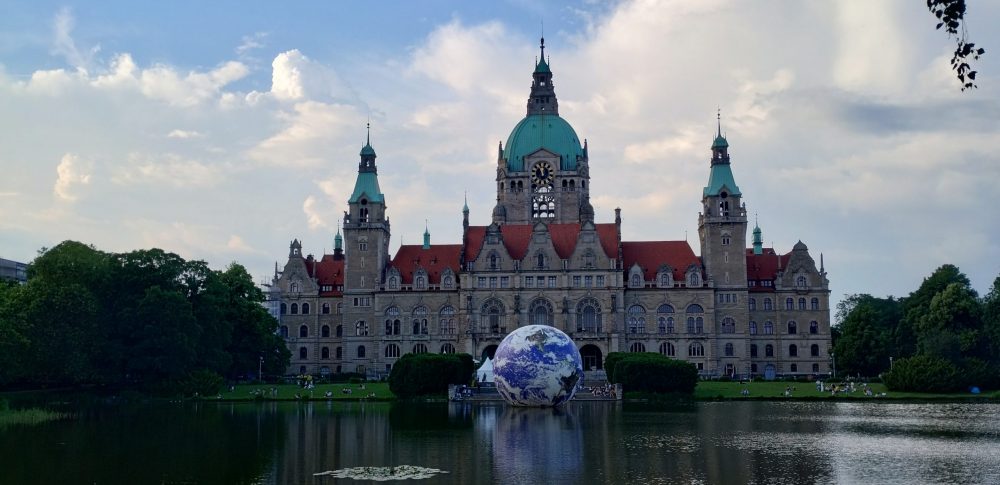When it comes to the German verb WERDEN, you will realize that translation to English as an aid to comprehension and learning reaches its limits. In the end, German is not English translated (and vice versa).
Depending on context, WERDEN kann mean different things. Let’s look at some examples:
Wenn I switch on my computer and go to my internet browser, I can read
- (Seite) wird geladen
It tells me that my internet browser is in the process of uploading.
Let’s look at some more:
- Es wird kalt.
- Ich werde müde.
- Gegenüber wird ein neues Haus gebaut.
- Die Party wird gut.
- Das Wetter wird schön.
- Das Wetter wird morgen schön.
- Wie wird in anderen Ländern Ostern gefeiert?
- Was wird in Japan zum Frühstück gegessen?
- Wann wird der Fahrstuhl endlich repariert?
- Er wird das nicht mögen.
- Das wird dir gefallen.
- Das Treppenhaus wird nicht fertig.
- Ihr werdet das bestimmt gut finden.
- Mein Auto wird gerade durchgecheckt.
- Ich glaube, sie wird sich nie ein Fahrrad kaufen.
- Was wird Pfingsten gefeiert?
- Wenn ich groß bin, möchte ich Tierärztin werden.
- Ich werde Astronaut.
- Alles wird gut.
- Es wird bald Frühling.
- Nächste Woche habe ich Geburtstag. Ich werde 18.
Exercise:
Match the sentences with how their meanings would be expressed in English.
- a) Spring is in the air.
- b) It’s getting cold.
- c) I’m getting tired.
- d) On the other side of the street they are building a new house.
- e) The weather will be nice tomorrow.
- f) It will be nice.
- g) The party is going to be great.
- h) How do they celebrate Easter in other countries?
- i) When are they going to repair the computer?
- j) Tomorrow is my 18th birthday.
- k) When I’m grown up, I want to become a vet.
- l) I want to be an astronaut or I’m going to be an astronaut (?I’ll be an astronaut – less common))
- m) Everything will be fine.
- n) I think she is never going to buy a bike.
- o) My car is being checked.
- p) I’m sure you will like it.
- q) He won’t like that.
- r) You’ll like that.
- s) What’s taking so long
- t) Finishing the staircase is taking very long.
- u) Why is Whitsun/Pentecost celebrated?
Determine which sentences seem to have a future time reference and in which sentences is an ‘active’ subject missing?
Beware of claims, on the internet or in (older) grammar books that WERDEN is the German ‘future tense’. Though you do find WERDEN plus infinitive of another verb described as FUTURE I in grammar references, it is as much (or as little) ‘future tense’ as WILL + infinitive is for English. From a linguistic perspective, neither language has a ‘future tense’. The reason for this is simple: When it comes to the future, there are many different attitudes we can express towards something that has not happened yet, or something we have not done yet. Thus we need a whole range of linguistic means to refer to something that lies in the future.
The sentence above from the weather forecast…
- Morgen wird es kalt
…definitely has future time reference. However, I could look out of the window and say….
- Es wird kalt
… meaning that it is getting cold already in that moment of speaking.
Future time reference is not grammaticalized in either language via a morphological change of the verb in the same way past time reference is. Sentences like …
- Morgen werden wir vielleicht ins Kino gehen.
- Am Wochenende wird es regnen.
- Das Theaterstück wird euch bestimmt gefallen.
- Nächsten Sommer werden wir vielleicht nach Spanien ziehen.
… all have future time reference, but I could just as well say…
- Morgen gehen wir vielleicht ins Kino.
- Am Wochenende regnet es (It is a little less likely that I would make such a strong statement about a future weather situation, but possible. More likely would be: Ich glaube, dass es morgen regnet.)
- Das Theaterstück gefällt euch bestimmt.
- Nächsten Sommer ziehen wir nach Spanien.
